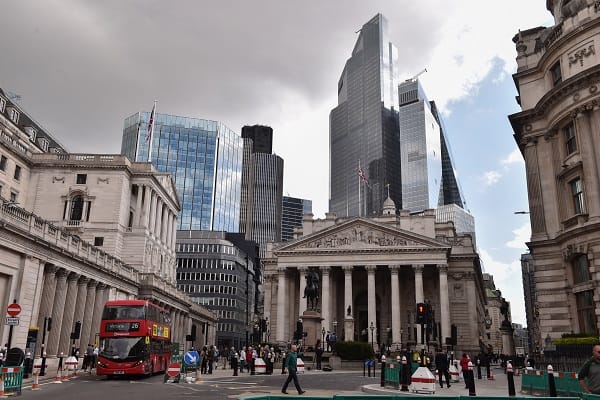On UK economic growth, the FT reported that, “Almost all respondents to the survey predicted growth would stagnate or at best hit 0.5 per cent in 2024.”
In The Times, 82.9% of respondents expected growth of between 0% to 1%. My reply to The Times was that growth for the year would be in the 0% to 1% range, while the FT asked for expectations of where growth would be in the fourth quarter, to which my reply was 1.2%.
On global growth, The Times reported that 71.8% of respondents expected it to be between 2% to 3%, I was in the 17.9% of respondents who expected it to be between 3% to 4%.
On inflation, the overall response to both surveys was that it would be above the inflation target this year, but head towards it in 2025.
On inflation, my reply to The Times was that, “I expect the annual rate of inflation to bottom in the second quarter, at below the 2% inflation target, before trending higher towards 3% by the end of 2024 and early 2025.” In replying to both surveys I said it was important that the Bank of England needs to avoid a Pyrrhic victory over inflation with an excessively tight monetary policy, which would hit the economy too hard.
The outlook for interest rates figured more in The Times survey. The breakdown of replies was: no rate cuts was expected by 5% of respondents; one cut by 7.5%; two cuts by 42.5%; three cuts by 17.5%; four cuts by 17.5%; more than four by 10%.
My reply was that I thought there should be five cuts but that there would be three: “Policy rates need to settle around 4% and I think that is where rates need to fall to by the end of the year. But instead I expect the Bank to cut three times, to 4.5%.”
While these surveys are a good barometer on current thinking, they can sometimes prove wide of the mark. For instance, just two years ago, in The Times survey, I was one of only two respondents who then thought inflation would exceed 7.5%, which it did.
It reflected how economists under-estimated the rise in inflation which was well underway even before Russia’s invasion. Meanwhile, the FT survey in recent years has tended to reflect too much pessimism about UK growth prospects, and there is thus the danger that this may again be in evidence now.
The FT publishes online the responses to its specific questions but individual replies to the specific questions on forecasts are not published.
The Times does not publish responses, but one of mine was quoted in their main story in the paper, namely that, “The end of cheap money has been one of the main themes in the last couple of years. Monetary easing should be the main story of 2024, reflecting the disinflationary global environment.”
Will voters feel better or worse about their living standards in the run-up to the next election?
Better, as living standards should improve over the coming year, but this will not compensate for the hit that has been seen since the 2008 financial crisis.
Since then the UK has become a low growth, low productivity and low wage economy. But, in 2024, wage growth should exceed inflation and allow living standards to improve. Voters will also be impacted by other factors, and thus the picture will vary.
The labour market should remain strong, even though the unemployment rate may rise slightly during the year. Lower interest rates may ease some stress in the housing market, but not remove it fully for those who are remortgaging.
Renters will continue to be squeezed by high rents eating into their disposable income. Even though there may be income tax cuts in the spring, this will not compensate fully for the non-indexation of the tax system and personal allowances not rising in line with inflation.
Will the Bank of England win its fight against inflation in 2024?
Given it notably lost the battle by letting inflation soar and misdiagnosing it as ‘transitory’, it is hard to claim the Bank will win the fight when inflation is set to decelerate.
Nonetheless, the Bank should avoid a Pyrrhic victory over inflation with excessive monetary tightening, which will hit the economy hard.
Having been too loose for too long, policy is now too tight. To put this in context, the current price level (data for October 2022) is 22 per cent above its level of only January 2020. Thus, the price level is far in excess of where it should be if monetary policy had been well executed, as opposed to poorly.
While inflation could touch the 2 per cent target during the course of the year, it still looks set to settle above the inflation target — at around 3 per cent — in 2025. This may allow the Bank to ease rates in 2024, but may limit its ability to cut rates aggressively.
Will the UK escape stagnation in 2024, and if so will it lag or outpace other advanced economies?
No. Growth will be low, even though inflation will decelerate. It will be in line with, or outpace the other major Western European economies, but it will lag the US.
Which single policy change after the next election would do most to improve the UK’s long-term growth?
Implementing credible and ambitious planning reforms to build more homes and business sites. Institutional change could also be explored, such as splitting HMT into growth and finance departments.
What is your forecast for UK annual GDP growth in 2024?
0% to 1%. The economy is stagnating and requires policy stimulus to avoid recession. While decelerating inflation will give a boost to real incomes and spending, the economy will require a policy stimulus in 2024, with tax cuts in the spring Budget and interest rate cuts through the year. However, income tax cuts will not compensate fully for the non-indexation of the tax system and personal allowances not rising in line with inflation.
What is your forecast for world GDP growth in 2024?
Just over 3%, based on the IMF’s measure of global GDP and thus slightly stronger than in 2023. Yet this is still a weak performance. The end of cheap money has been one of the main themes in the last couple of years.
Monetary easing should be the main story of 2024, reflecting the disinflationary global environment. This is in addition to the key underlying story which is the shift in the balance of economic power to the IndoPacific, which stretches from India in the west to the US in the east.
The markets began 2023 too pessimistic about the West and too optimistic about China. Now, expectations are the other way, and for the West to avoid recessions requires significant policy easing, while expectations are too pessimistic about China. India should be the strongest major global economy, as it benefits from sizeable inward investment and its catch-up potential is huge. Meanwhile, US growth looks set to outstrip the UK and euro area.
What level will UK unemployment hit at the end of 2024?
4% to 5%. Even though the unemployment rate may rise slightly during the year, I expect firms to continue to hold on to skilled labour.
What do you expect (CPI) inflation to be at the end of 2024?
2.5% to 3.5%. I expect the annual rate of inflation to bottom in the second quarter, at below the 2% inflation target, before trending higher towards 3% by the end of 2024 and early 2025.
How will UK house prices perform over 2024?
Flat.
How many times will the Bank of England cut interest rates in 2024?
Three times. The Bank of England needs to avoid a Pyrrhic victory over inflation with an excessively tight monetary policy, which would hit the economy too hard. Having been too loose for too long, monetary policy is now too tight. The Bank of England lost the battle against inflation by letting inflation soar and misdiagnosing it as ‘transitory’.
In 2024 monetary policy needs to be eased, both in terms of lower policy rates and by not proceeding with Quantitative Tightening as currently planned. While cutting interest rates will help the economy, returning to an era of cheap money needs to be avoided, given its damaging economic, social and financial consequences.
Where will UK interest rates end the year?
4% to 5%. I think interest rates are already too high. Policy rates need to settle around 4% and I think that is where rates need to fall to by the end of the year. But instead, I expect the Bank to cut three times, to 4.5%.
How many times will the Federal Reserve cut interest rates in 2024?
More than four. The US looks set for a soft landing, and the Fed’s dual mandate points to a bias towards easing, with five rate cuts.
Rates in the US, UK and euro area need to fall in 2024. I do not see this as being inconsistent with rates being higher for longer as my view is that rates will need to stabilise at higher levels in the future, as we enter 2025, than pre-pandemic, but not stabilise at current levels. One of the key debates in 2024 is likely to be where is the future neutral level for policy rates. The focus may be on 3% to 4%, as opposed to previously lower levels.
How many times will the ECB cut interest rates in 2024?
Three. The euro area will begin the year in a technical recession, and as inflationary pressures ease this will reinforce the pressure upon the ECB to cut rates by the second quarter, and through the rest of the year.
Will there be a Middle East driven oil and energy crisis this year?
No. But I expect geopolitical tensions to persist throughout the year and this may, at times, lead to a higher risk premium being factored into oil and energy prices.
Please add any comments on a Trump victory for the world economy.
Geopolitical tensions look set to persist whoever wins the US election. A Trump victory would reinforce the shift to a G3 world, with group one being the US and its allies, group two led by China and group three the non-aligned group of Middle Ground Powers led by India and Nigeria, among others.
Trade tensions may re-emerge. US fiscal policy will remain loose, whoever wins, although with a Trump victory one should expect a switch away from Biden’s IRA and pro-green policy but would still include tax cuts aimed at business.






Leave a Comment